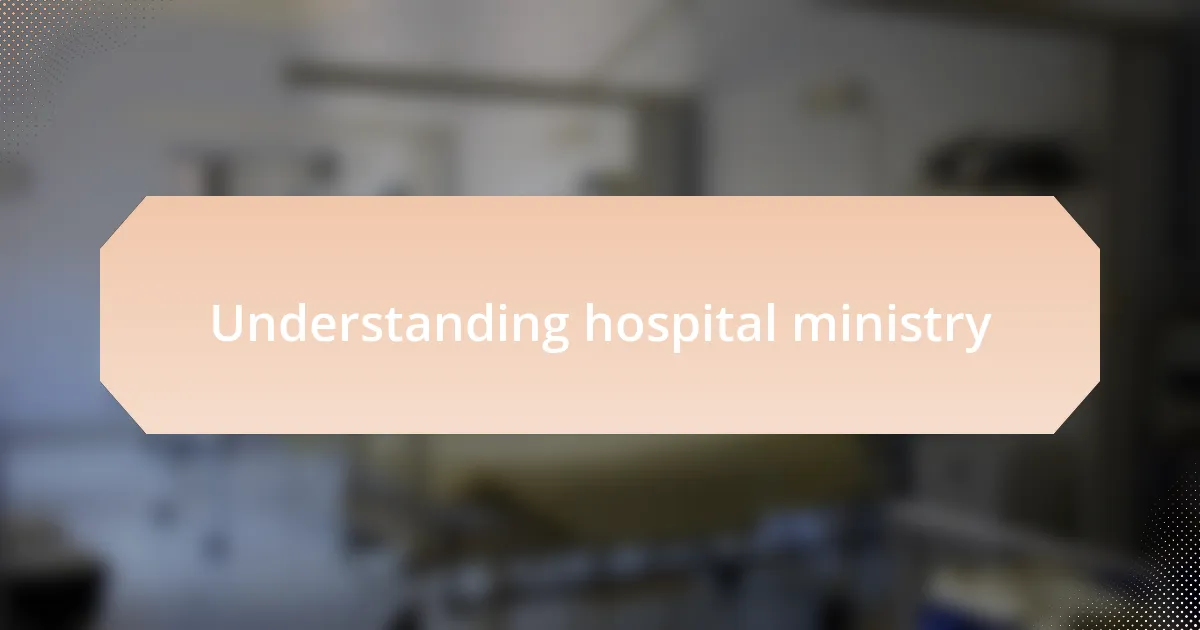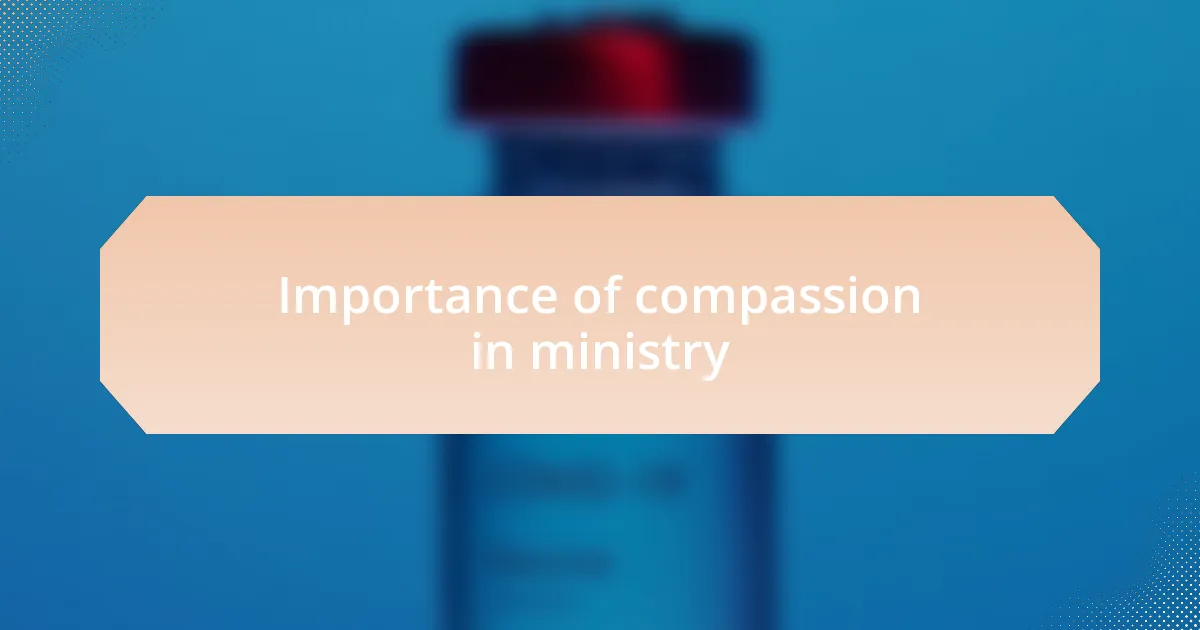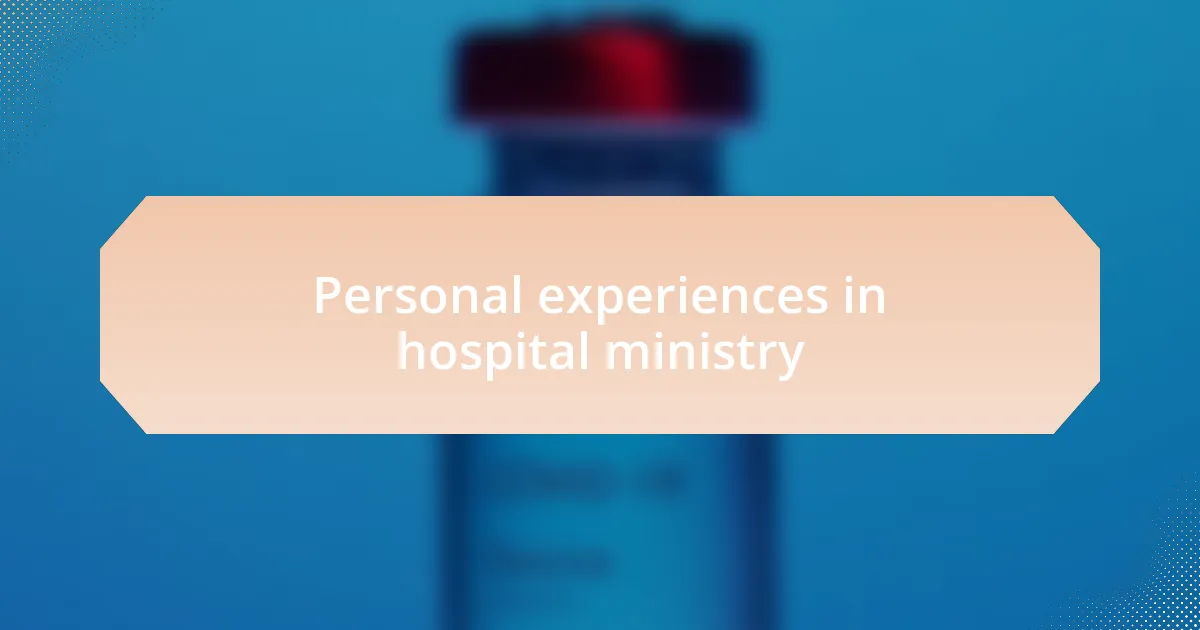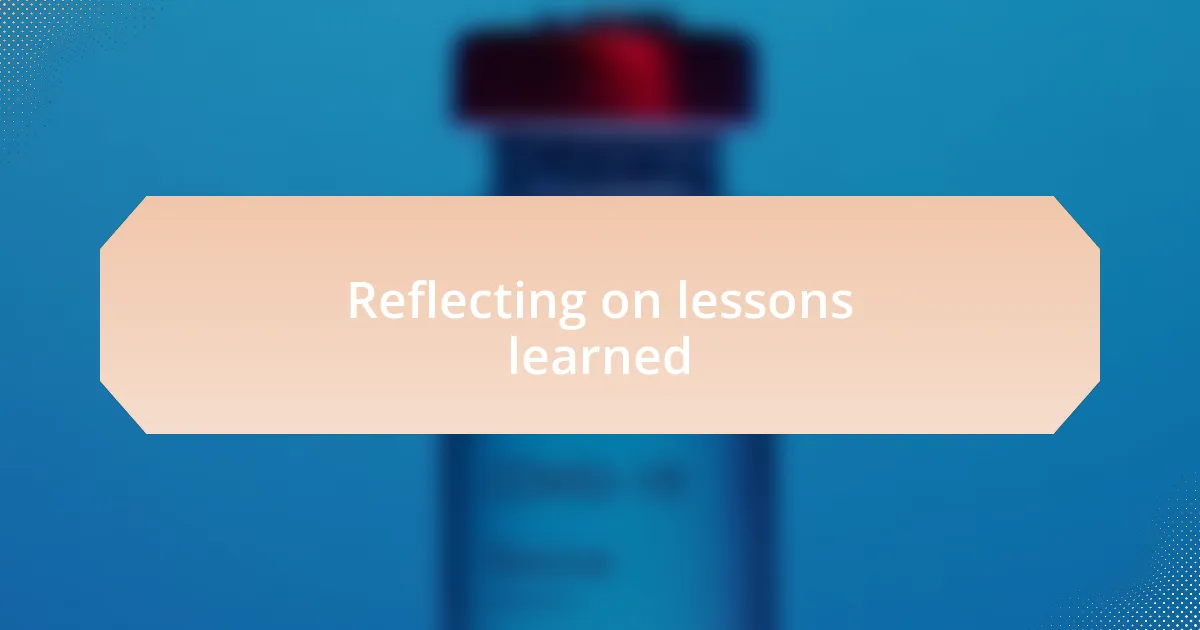Key takeaways:
- Hospital ministry combines spiritual support with medical care, emphasizing emotional healing alongside physical recovery.
- Compassionate listening can profoundly impact individuals facing medical challenges, fostering deeper faith exploration and resilience.
- Shared vulnerability and genuine connection can serve as powerful healing tools in times of distress.
- Actively being present and patient with patients’ feelings often leads to meaningful moments of peace and understanding.

Understanding hospital ministry
Hospital ministry is a unique form of outreach that combines spiritual support with medical care. I remember my first experience volunteering at a local hospital, watching how a simple prayer with a patient could transform their anxiety into a moment of peace. It made me realize that in such challenging times, emotional and spiritual guidance can be just as crucial as physical healing.
This ministry is often about meeting people in their most vulnerable moments, offering compassion without judgment. Have you ever noticed how a smile or a kind word can lighten the atmosphere? I’ve seen how powerful these small gestures can be; they reveal that, even in pain, there is hope and connection. It’s the essence of showing people they are not alone, fostering relationships built on trust and empathy.
Moreover, hospital ministry encourages caregivers to reflect on their own spiritual journeys. I think about the times I was challenged by a patient’s profound faith in the face of adversity. It has left me pondering: how can we navigate our own doubts while supporting others? This interplay between personal belief and service not only enriches the experience for the person receiving care but also deepens the spiritual growth of those who serve.

Importance of compassion in ministry
Compassion in ministry acts as a bridge that connects the spiritual and emotional needs of individuals during their most trying times. I often recall a day in the hospital when I sat with a family grappling with a devastating diagnosis. Just as I began to lose hope in the situation, I noticed their gratitude for simply having someone listen. How many times have we underestimated the power of a compassionate ear?
This approach not only comforts those in distress but also lays the groundwork for deeper faith exploration. I distinctly remember a patient sharing their fears of life beyond treatment, and through our conversations, they began to articulate their spiritual struggles. In those moments, I was reminded that compassion cultivates an environment where doubts can be confronted and hope can flourish.
Furthermore, compassion serves as a catalyst for healing — both physically and spiritually. I’ve witnessed how an act of kindness, like holding a hand during an anxious moment, can create a ripple effect of positivity. Isn’t it remarkable how such simple gestures can enhance resilience and inspire strength in others? In ministry, this nurturing spirit becomes essential for not just the patients but also the caregivers, forging a community bonded by shared experiences and mutual support.

Personal experiences in hospital ministry
Each shift I work in the hospital, I find myself inspired by the resilience of the patients I meet. One particular afternoon, I spoke with a young mother undergoing treatment while trying to maintain a brave face for her children. As she opened up about her fears of leaving them, I felt a deep connection — her vulnerability resonated with my own experiences of uncertainty. How often do we hide our fears, only to find strength in shared vulnerability?
In another instance, I comforted an elderly man who had just received unsettling news about his health. We struck up a conversation, and as he shared stories from his long life, something shifted in the room. I could see the weight of grief lighten, even if just a little. Isn’t it fascinating how storytelling can become a healing balm? It reinforced for me that sometimes, all someone needs is the reassurance that their voice matters.
I also remember a moment filled with laughter amidst sorrow. While visiting a patient who was struggling emotionally, I brought in a few funny anecdotes from my life. The shift in her demeanor was immediate; laughter broke through her walls, creating space for deeper dialogue about her faith and fears. In those moments, I realize that compassion is not just about solemnity, but also about finding joy together, even in tough times. How often can a smile transform the atmosphere, easing the burden we carry?

Reflecting on lessons learned
In reflecting on my experiences, I’ve learned that compassion often requires me to put aside my own feelings. I recall a time when I visited a patient who was anxious about her surgery. Instead of trying to reassure her with facts, I simply sat with her silence, allowing her to express her worries. There was something profound about bearing witness to her fears that brought us both a sense of peace. Have you ever realized that sometimes, presence is more impactful than words?
Another lesson that stands out is the importance of patience in ministry. A particular visit with a confused elderly woman who kept repeating the same question taught me this. Initially, I felt frustrated with the situation, but I soon recognized her need for reassurance. By responding gently and listening attentively, I helped her find comfort in the repeat of her thoughts. Isn’t it amazing how empathy can turn our irritation into understanding?
Through these experiences, I’ve come to appreciate the small moments that teach big lessons. I remember sharing a quiet cup of tea with a patient, where we talked little but shared so much. In that space, I was reminded that companionship can often serve as a healing force. Have you ever considered how simple acts, like sharing a drink, can cultivate a sense of community and help us heal?